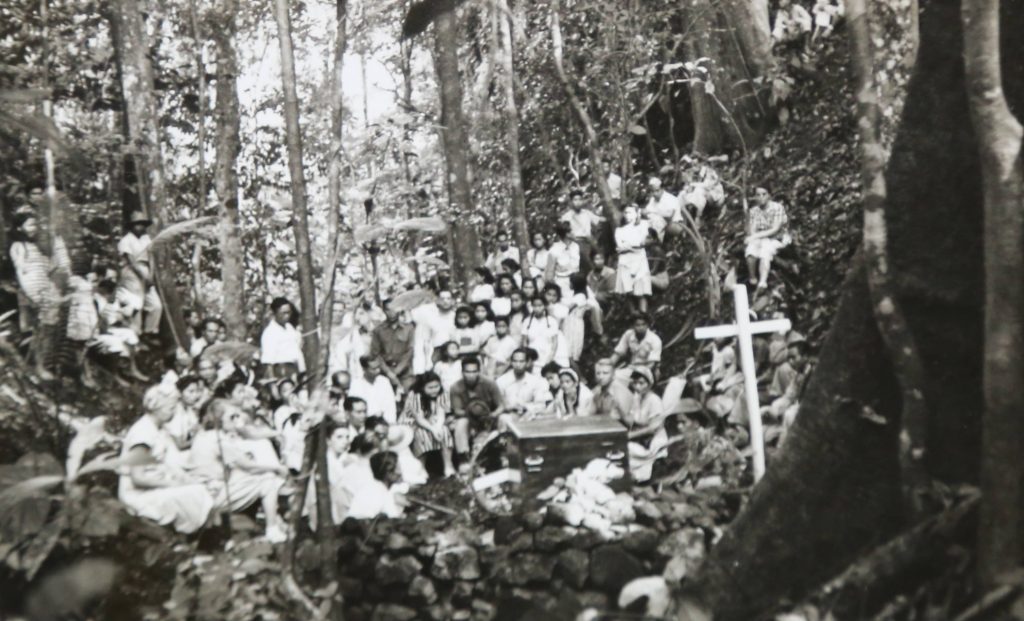By Keziah G. Huelar
After World War II, CPBC members started a tradition of pilgrimage to the Cathedral in the Glen also known as the Hopevale Memorial.
At some point of our lives we have considered giving up. Our soul seeks rests, our hearts wishes to retreat into solitude. There are things in this world that may be too much for us to bear—the pressures of life consume us all. Yet despite these moments of denouement, we persevere not only as a necessity but as a response to the choices we make.
Such a choice has been testified through the life of the Hopevale martyrs. Up to the end of their lives, they chose to persevere and trust in the Lord—11 men and women of faith—whose lives we now emulate as we reflect upon pursuing a life of faith with fervor.
In one of her poems entitled “I am weary of war”, Jennie C. Adams, one of the martyrs, talks about a longing for rest and ease;
I am weary of war and its worries,
The life in a forest wild
The haunts of a lovely hermit,
A captive too long exiled
Ever ready to flee still further
When the warning cry is heard,
Whether that cry be official
Or proves but a rumored sword
The vigilance ever required
When enemy troops grow bold,
Or when thieves alone molesting,
Or but termites, mildew and mold.
I am weary of war and hatreds,
When a friend may become a foe;
A nation, a neighbor or brother
Into a traitor may grow.
Need presses hard upon people
One grasps from another’s pain
Out of some poor man’s misery
A neighbor grows greedy for gain.
One clamors for share and profit
A place, a position or fame,
One lives or dies a hero,
His brother lives in shame.
I am weary of war and its sufferings,
The nameless dreads and fears,
The needless wounds and heartaches
The women’s bitter tears
The children in rags growing hungry,
Hunger on every hand,
No schools for their idle hours,
With pestilence stalking the land.
I am weary of war and destruction,
A land once so verdant and fair,
Busy and prosperous and peaceful
Is scorned and seared and bare,
What wanton waste of nations
Whose country with beauty was filled,
The gems of civilized nations
That years have required to build.
The treasures of homes and nations,
That ages so dearly have brought
By ruthless war’s destruction,
In a moment is put to naught
How hard it must have been for the Hopevale martyrs to retreat to the mountains, away from the comforts of civilization. They found themselves in the midst of primitive living where they made an altar and a pulpit from rocks and wood at hand.
But oh, how hopeful they were! In the heart of the Japanese-American War, we had missionaries gathering together to worship God in the midst of all the doubt and uncertainty. On Easter Sunday of 1943, it is said that 100 worshipers, both Americans and Filipinos, were in attendance to glorify God. Several missionaries took turns in conducting the worship services.
How beautiful it is to worship God in the midst of trial—like Paul and Silas when they prayed and sang songs of praise in prison, when Stephen exclaimed, “I see heaven open and the Son of Man standing at the right side of God!” right before those who were about to stone him, and when the Hopevale martyrs asked for an hour to pray and to sing hymns before they were led to the mountain top and killed.
Whenever life drags you down, the remedy is to praise God, to trust in His promises. At times, the greatest blessing is not the fulfillment of the promise but the ability to believe and to hope that what God has spoken will come to pass. As what 2 Corinthians 1:20 says, “For all the promises of God in Him are Yes, and in Him Amen, to the glory of God through us.”
Adams, in her poem “Let me live bravely,” published in the 1946 Centralite, encourages us to learn to trust God before, during, and after life’s troubles.
“Let me serve faithfully;
Content with work to do, Whatsoever life may bring,
I’m serving others well, Thus do I serve my King.
May I not weary grow, When tasks seem burdensome,
Nor turn aside distraught, Before life’s work is done.
As others served, proved true, Let me be faithful too.”

